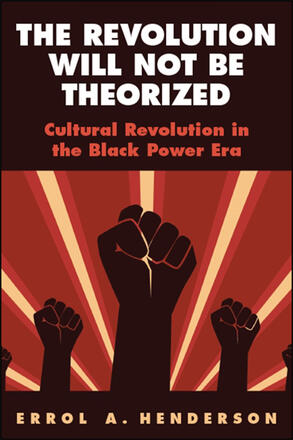
The Revolution Will Not Be Theorized
Cultural Revolution in the Black Power Era
Alternative formats available from:
Open access edition available from:
Studies the revolutionary theory of the Black Power Movement in the 1960s through ʼ70s, placing it within the broader social theory of black revolution in the United States since the nineteenth century.
Description
The study of the impact of Black Power Movement (BPM) activists and organizations in the 1960s through ʼ70s has largely been confined to their role as proponents of social change; but they were also theorists of the change they sought. In The Revolution Will Not Be Theorized Errol A. Henderson explains this theoretical contribution and places it within a broader social theory of black revolution in the United States dating back to nineteenth-century black intellectuals. These include black nationalists, feminists, and anti-imperialists; activists and artists of the Harlem Renaissance; and early Cold War–era black revolutionists. The book first elaborates W. E. B. Du Bois's thesis of the "General Strike" during the Civil War, Alain Locke's thesis relating black culture to political and economic change, Harold Cruse's work on black cultural revolution, and Malcolm X's advocacy of black cultural and political revolution in the United States. Henderson then critically examines BPM revolutionists' theorizing regarding cultural and political revolution and the relationship between them in order to realize their revolutionary objectives. Focused more on importing theory from third world contexts that were dramatically different from the United States, BPM revolutionists largely ignored the theoretical template for black revolution most salient to their case, which undermined their ability to theorize a successful black revolution in the United States.
This book is freely available in an open access edition thanks to TOME (Toward an Open Monograph Ecosystem)—a collaboration of the Association of American Universities, the Association of University Presses, and the Association of Research Libraries—and the generous support of The Pennsylvania State University. Learn more at the TOME website, available at: openmonographs.org, and access the book online at http://muse.jhu.edu/book/67098. It is also available through the SUNY Open Access Repository at http://hdl.handle.net/20.500.12648/1704.
Errol A. Henderson is Associate Professor of Political Science at Pennsylvania State University. He is the author of several books, including African Realism? International Relations Theory and Africa's Wars in the Postcolonial Era.
Reviews
"Errol A. Henderson's masterful and powerful book lays bare the complex dynamics of the revolutionary black nationalist tradition in the US empire. It is the best treatment we have of the theoretical contributions of Malcolm X, Harold Cruse, Grace Boggs, and others that attempt to connect revolutionary efforts to black cultural institutions. His fascinating reflections on reverse civilizationism are worth the book! And Henderson's magisterial work helps bring back revolutionary theory and praxis in our grim neofascist times!" — Cornel West
"This book is not only one of the most intellectually ambitious works but also the most comprehensive examination of revolutionary theory in the Black Power Era. A monumental accomplishment. Bravo!" — Komozi Woodard, author of A Nation within a Nation: Amiri Baraka (LeRoi Jones) and Black Power Politics